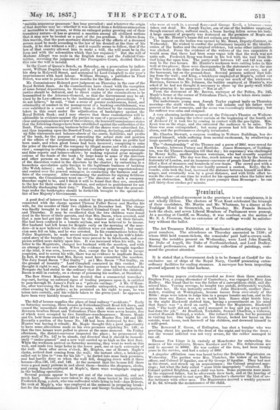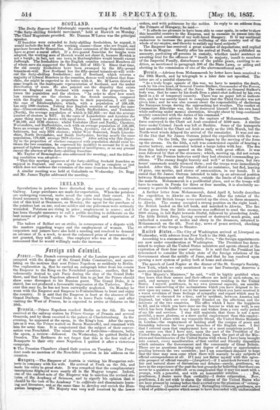VrouillE in t.
Although political movement in the provinces is not conspicuous, it is not wholly lifeless. The electors of West Kent celebrated the triumph of their candidates, Mr. Martin and Mr. Whatman, by a dinner at the Trafalgar Hotel in Greenwich, on Thursday. Mr. Francis Bennoch took the chair, and seven Liberal Members of Parliament were present. At a meeting at Cardiff; on Monday, it was resolved, on the motion of Mr. E. A. Freeman, that no extension of the suffrage would be satisfactory without the ballot.
The Art Treasures Exhibition at Manchester is attracting visitors in great numbers. The attendance on Thursday amounted to 7330; of whom 383.5 held season-tickets, the remainder paid half-a-crown each. Among the notables present on Wednesday, were Lord John Russell, the Duke of Argyll, the Duke of Northumberland, and Lord Dudley. Musical performances, and the amazing collection of paintings, command the greatest attention.
It is stated that a Government dock is to be formed at Cardiff for the exclusive use of ships of the Royal Navy, Cardiff presenting extraordinary facilities for coaling steamers. A surveyor has been inspecting ground adjacent to the tidal harbour.
The morning papers yesterday recorded no fewer than three murders. Stephen Fox, a young shoemaker of Canterbury, was engaged to Mary Ann Hadley. She found that he was the father of a surreptitious child, and dismissed him. Vowing revenge, he bought two pistols, deliberately, waylaid, and shot her. He was instantly arrested. John Blackwell, another shoemaker, residing at Wokingham, became insane from over-study of the Bible : steps were taken to lodge him in a pauper lunatic asylum, and in the mean time one Ranee was set to watch him. Rance slept beside himin the night Blackwell stabbed him, having a presentiment on his mind that Rance N1'118 " a devil on earth. " Before the Magistrate, Blackwell said, "The knife did not cut, and I managed to hag and jag away until I had done the job." At Bradford, Yorkshire, Samuel Charlton, a widower, courted Hannah Ilolroyd, a widow. She refused his offers, but he persisted in visiting her. One night he cut her throat, locked her house on the outside, went home, took farewell of his children, and drowned himself in a mill-pond.
The Reverend F. Green, of Erdington, has shot a burglar who was prowling about his garden in the dead of the night and trying the doors ; but the wound inflicted was not very severe, for the robber managed to run off.
Thomas Fox Lings is in custody at Manchester for embezzling the moneys of his employers, Messrs. Kershaw and Co. His defalcations are said to amount to 60001. He was cashier of the firm, had been twenty years in the service, and had a salary of 5001.
A singular affiliation case was heard before the Brighton Magistrates on Wednesday. The parties were Mrs. Thatcher, the widow of an Indian officer, and Colonel ])'Aguilar, son of Sir George D'Aguilar. They had met in the street, and struck up an acquaintance ; the Colonel proposed marriage; but what the lady called "same little impropriety" occurred. The Colonel quitted Brighton, and a child was born. Some payments were made by the supposed father, but he afterwards drew back, and at the hearing of _ the case endeavoured to cast upon Mrs. Thatcher's character the blot of undue intimacy with other men. The Magistrates decreed a weekly payment of 28. 6d. towards the maintenance of the child. SCOTLAND.
the forty-shilling freehold movement," held at Hawick on Monday. 'The Chief Magistrate presided. Mr. Duncan M'Laren was the principal speaker. If franchise were extended to forty-shilling freeholders, he argued, it would include the best of the working classes—those who are frugal, and purchase houses for themselves. No other extension of the franchise would have so groat a moral effect. If a five-pound franchise for burghs were adopted, the working men of Ilawick would not share it, because Howl& is not a burgh ; in fact, not one towo in Roxburghshire would benefit except Jedburgh. The fre&olders in the English counties returned Members all of whom save six supported the Reform Bill of 1831-'2. Since that time, the old county freeholders have been swamped by the fifty-pound tenants-at-will. Now Scotland has the fifty-pound tenants-at-will without the forty-shilling freeholders; and if Scotland, which returns a majority of Liberal Members in the counties, does so well without that franchise, she might be expected to do better with it. Mr. 3I'Laren dilated at Some length on the inadequate representation of Scotland, and the unfair distribution of seats. He also pointed out the disparity that exists between England and Scotland with respect to the proportion between the population awl the electors. "In order to show how much less numerous are the electors in the Scotch counties, compared with the English ones, in proportion to their population, I will take the case of Edinburghshire, which, with a population of 259,439, has only 1960 electors. Taking four English counties of nearly the same size—Gloucestershire, East Norfolk, North Staffordshire, and 'Yorkshire (North), the average population of which is 257,055—we find the average number of electors is 9577. In the cases of Lanarkshire and Ayrshire the same thing may be shown with equal force. Lanark has a population of .5 30,169, and 3126 electors; whilst Yorkshire (East and North), Cheshire, D evonshire, and Staffordshire, each with an average population of 528,409, have an average of 17,996 electors. Then, Ayrshire, out of its 189,859 inhabitants, has only 3976 electors; whilst West Somerset, South Lincolnshire, North Devonshire, and South Derbyshire, having nearly the same population, 179,659, average 7979 electors." After asking why this disparity in the proportion of electors compared with population should exist between the two countries, he expressed his inability to account for it on the ground of lighter taxation, lower standard of intelligence, or on any ground except the absence of the forty-shilling franchise. Mr. Taylor of Birmingham also addressed the meeting; and the following resolution was adopted— "That this meeting approves of the forty-shilling freehold franchise as enjoyed in England, and can regard no reform bill as complete or just which does not embrace the extension of the same franchise to Scotland." A similar meeting was held at Galashiels on Wednesday. Dr. Begg and Mr. James Taylor addressed the meeting.
IRELAND. _ Speculations in potatoes have disturbed the peace of the county of Galway. Large purchases are made for exportation. When the potatoes are undergoing removal, mobs assail the carts and their escort. It is found necessary to bring up soldiers, the police being inadequate. In a riot of this kind at Oraumore, on Monday, the agent for the purchase of the potatoes lost an ear, and one soldier and one policeman were seriously wounded. Potatoes are rising in price; employment is scarce; and it has been thought necessary to call a public meeting to deliberate on the best moans of putting a stop to the "forestalling and exportation of potatoes." The tailors of Belfast are on strike, in consequence of a dispute with. the masters regarding wages and the employment of women. The carpenters and joiners have also held a meeting and resolved to demand an advance of 2s. a week, to meet the enhanced price of necessaries : if not granted, they will strike. One employer who was at the meeting .announced that he would willingly make the increase.



























 Previous page
Previous page